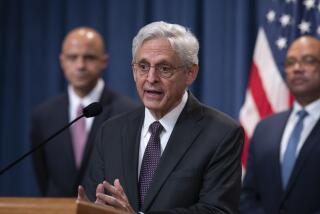Trials start for 100 reformists, moderate politicians in Iran
BEIRUT — Iran’s hard-line judiciary Saturday put 100 prominent moderate politicians and others on trial, accusing the country’s main reformist political groups of working with foreigners to foment a popular uprising against the government.
The opposition immediately decried the charges as groundless and said the mass indictment was filled with errors that suggested it was hastily made up, perhaps by the editors of the vociferously right-wing newspaper Kayhan.
“The text of the indictment is so close to the literature of the editorials of Kayhan that even a baked chicken would laugh,” the Islamic Iran Participation Front, the country’s main reformist political group, said in a statement that was reported on the news website Norooznews.ir. “The Front calls for the release of the prisoners and giving them access to [a] lawyer.”
Analysts say the confessions read at the trials are meant to lift the morale of hard-liners upset by coverage by reformist news outlets and Persian-language news channels abroad as well as to frighten opponents and take the wind out of the sails of the protest movement.
But as night fell, Tehran, the capital, erupted in angry cries of “Allahu Akbar!” or “God is great!” in what has become a daily rooftop ritual of protest.
Iranians are bracing for another round of protests this week, when President Mahmoud Ahmadinejad is expected to be confirmed for a second term by supreme leader Ayatollah Ali Khamenei and sworn in by parliament.
State-controlled television broadcast images of the three-hour court session, in which prisoners clad in jailhouse uniforms filled a courtroom alongside security officials.
Some of the defendants, who have been held for six weeks without access to lawyers or their families, spoke at a news conference later, in which they accused the opposition of making up charges of vote fraud.
Iranian authorities accused several politicians, including former Vice President Mohammad Ali Abtahi, of planning the riots before the elections and sparking them by allegations of vote fraud.
“ ‘Cheating’ was the code word for the riot in which people were mobilized to take to the streets,” the Fars news agency quoted Abtahi as saying.
“Of course, I was not in favor of Ahmadinejad’s presidency. I did not accept this election, and by that non-acceptance I prevented the growth of civil society and I betrayed Iranian culture and history,” Abtahi said, according to Fars.
The normally jovial cleric appeared gaunt and withdrawn as he sat in the courtroom. A photograph showed Abtahi reading the confession from a handwritten document. Reformist news websites quoted his wife as saying he had been drugged. His daughter told BBC Persian that his lawyer had been barred from the proceedings.
In previous cases, Iranian dissidents held in solitary confinement and subjected to grueling interrogations were forced to record or sign confessions admitting political or sexual transgressions as a condition for their release or transfer to general wards.
Human rights activists, international monitors and Iranian legal authorities say such jailhouse confessions don’t meet international or local standards.
“These confessions are illegal, and what the defendants say is baseless,” said Khalil Bahramian, a prominent Tehran human rights lawyer. “Instead, the confession-takers and those who ordered the forced confessions and all involved in this show trial should be brought to justice.”
Bahramian said the confessions were meant to silence dissidents and distract public attention before Ahmadinejad’s inauguration.
But few appeared cowed Saturday. Reformists immediately condemned the proceedings as a sham by hard-liners meant to criminalize opposition to Ahmadinejad’s disputed victory in the June 12 election, which ignited continuing unrest.
“The electoral coup d’etat fomented by hard-liners has entered a new phase with the ridiculous massive show trial of a group of detainees,” the Islamic Iran Participation Front statement said, calling the Fars news agency “the propaganda arm and mouthpiece of the coup.”
The leading reformist challenger, Mir-Hossein Mousavi, quickly issued a statement denying that the political movement built on his presidential campaign had connections to the West or was seeking to undermine the Islamic Republic.
“This righteous and spiritual movement does not have the least link with foreigners and it is 100% domestic,” he said on his website, Ghalamnews.ir.
The office of Ayatollah Ali Akbar Hashemi Rafsanjani, a powerful cleric who has supported Mousavi, dismissed the confessions “as sheer lies,” adding, “It is not clear how and under what conditions they have been expressed.”
--
Special correspondent Ramin Mostaghim in Tehran contributed to this report.
More to Read
Sign up for Essential California
The most important California stories and recommendations in your inbox every morning.
You may occasionally receive promotional content from the Los Angeles Times.









